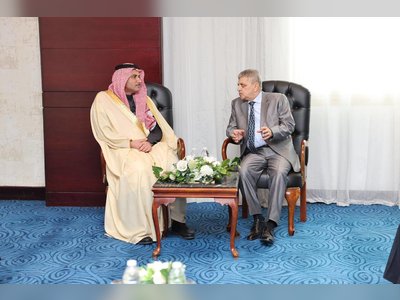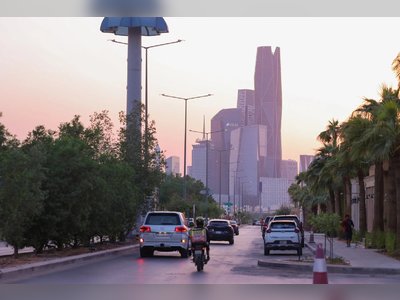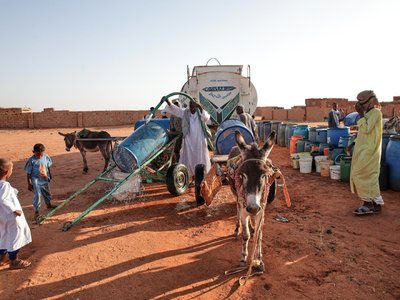
Syrian Mercenaries Recruited by Turkish Company for Niger's Turkish-Backed Regime: Fighters' Perspectives
Omar, a 24-year-old Syrian fighter, left northern Syria for Niger last year to join other pro-Turkish mercenaries sent by a private Turkish military company.
He cited lack of job opportunities and low pay in Syria as reasons for his departure.
Analysts believe Turkey has strong ties with Niger's new military regime, and over 1,000 Syrian fighters have been sent to Niger in recent months to protect Turkish projects and interests.
Turkey has been expanding its presence in Niger through humanitarian aid, development, and commerce over the past decade.
(100 words) The defense relationship between Niger and Turkey has strengthened with a military cooperation agreement in 2020 and the sale of armed drones.
Niger views Turkey, Russia, and China as respectful of its sovereignty.
Omar, a Nigerien fighter for a pro-Ankara faction in Syria, earns a monthly salary of $1,500 and hopes to start a business and leave the battlefield.
Tens of thousands of young men have joined jihadist factions and Ankara-loyal groups in Syria's north and northwest, where four million people live in dire conditions.
Omar and two other Syrian fighters described how they joined the Sultan Murad faction, a Turkish proxy group in Syria, and were sent to Niger for a six-month contract with SADAT International Defense Consultancy.
The company, which is widely believed to be Ankara's secret weapon in conflicts in North Africa and the Middle East, handled their travel and accommodations.
The fighters signed contracts with SADAT officers and are now preparing to return home after their contracts ended.
SADAT's chief denied the allegation of being Ankara's secret weapon in a 2021 interview with AFP. In 2020, the United States accused the Syrian armed group, SADAT, of sending fighters to oil-rich Libya, supported by Turkiye.
The Observatory and Syria Justice and Accountability Center reported that Turkiye sent thousands of Syrian fighters to Libya to support the Tripoli government and Nagorno-Karabakh, with SADAT responsible for transporting mercenaries.
Turkiye also sent Syrian fighters to Azerbaijan for Nagorno-Karabakh conflict.
However, Turkiye's defense ministry denied allegations of sending mercenaries to Niger, where Omar, a Syrian refugee, claimed to have been transported to after passing through Gaziantep and Istanbul on a military plane.
A Syrian man, named Ahmed, completed two weeks of military training and was assigned to guard a mine site in an unnamed location, working alongside Nigerien soldiers.
He was part of several groups, with some sent to fight Boko Haram and others to Lome, without specifying their missions.
Ahmed's family receives his monthly salary, which is reduced by a $350 fee for his faction.
He had been told his mission would involve protecting military positions, and there could be battles, but he didn't know whom he would be fighting against.
Ahmed had previously spent six months in Libya earning over $2,000 a month.
In July 2023, the military took control of Niger's government, leading to the termination of security agreements with Western countries like France.
Despite this, diplomatic relations between Niger and Turkey remained intact, with the appointment of a Turkish defense attache and increased engagement through a French-language TV channel and daily flights.
Turkey's religious and political proximity to Niger makes it more favorably viewed compared to Western countries.
However, Rami Abdel Rahman of the Syrian Observatory for Human Rights accused Turkey of exploiting impoverished men in areas under its control by recruiting them as mercenaries for military operations serving Ankara's foreign interests.
Human rights groups, including the war monitor, have reported that mercenaries from Syria and other countries are not always paid as promised when they are sent abroad to fight.
Mohammad Al-Abdallah of the Syria Justice and Accountability Center gave an example of false promises of Turkish citizenship to Syrians sent to Azerbaijan and Libya.
Reports suggest that about 50 Syrian fighters have been killed in Niger, but only nine deaths have been verified by the Violations Documentation Center for Syria and Turkey.
A source within a Syrian faction said about 50 bodies were expected to return soon.
A Syrian father named Abed, who has been displaced with his family for over a decade and is the sole breadwinner, spoke to AFP about his decision to risk death by becoming a mercenary.
He expressed fear of dying but felt it was a risk worth taking due to the dire circumstances of his family.
A Syrian refugee named Ahmet shared his experience of fleeing war-torn Syria and facing the risk of death again while trying to cross the desert from Niger to Libya in search of a better life in Europe.
He expressed that in Syria, he would be willing to die for a small amount of money, but in Niger, the price of death was higher at $1,500.
He acknowledged the risk of death but saw it as a necessary sacrifice to reach Europe and provide a better future for his family.
Analysts believe Turkey has strong ties with Niger's new military regime, and over 1,000 Syrian fighters have been sent to Niger in recent months to protect Turkish projects and interests.
Turkey has been expanding its presence in Niger through humanitarian aid, development, and commerce over the past decade.
(100 words) The defense relationship between Niger and Turkey has strengthened with a military cooperation agreement in 2020 and the sale of armed drones.
Niger views Turkey, Russia, and China as respectful of its sovereignty.
Omar, a Nigerien fighter for a pro-Ankara faction in Syria, earns a monthly salary of $1,500 and hopes to start a business and leave the battlefield.
Tens of thousands of young men have joined jihadist factions and Ankara-loyal groups in Syria's north and northwest, where four million people live in dire conditions.
Omar and two other Syrian fighters described how they joined the Sultan Murad faction, a Turkish proxy group in Syria, and were sent to Niger for a six-month contract with SADAT International Defense Consultancy.
The company, which is widely believed to be Ankara's secret weapon in conflicts in North Africa and the Middle East, handled their travel and accommodations.
The fighters signed contracts with SADAT officers and are now preparing to return home after their contracts ended.
SADAT's chief denied the allegation of being Ankara's secret weapon in a 2021 interview with AFP. In 2020, the United States accused the Syrian armed group, SADAT, of sending fighters to oil-rich Libya, supported by Turkiye.
The Observatory and Syria Justice and Accountability Center reported that Turkiye sent thousands of Syrian fighters to Libya to support the Tripoli government and Nagorno-Karabakh, with SADAT responsible for transporting mercenaries.
Turkiye also sent Syrian fighters to Azerbaijan for Nagorno-Karabakh conflict.
However, Turkiye's defense ministry denied allegations of sending mercenaries to Niger, where Omar, a Syrian refugee, claimed to have been transported to after passing through Gaziantep and Istanbul on a military plane.
A Syrian man, named Ahmed, completed two weeks of military training and was assigned to guard a mine site in an unnamed location, working alongside Nigerien soldiers.
He was part of several groups, with some sent to fight Boko Haram and others to Lome, without specifying their missions.
Ahmed's family receives his monthly salary, which is reduced by a $350 fee for his faction.
He had been told his mission would involve protecting military positions, and there could be battles, but he didn't know whom he would be fighting against.
Ahmed had previously spent six months in Libya earning over $2,000 a month.
In July 2023, the military took control of Niger's government, leading to the termination of security agreements with Western countries like France.
Despite this, diplomatic relations between Niger and Turkey remained intact, with the appointment of a Turkish defense attache and increased engagement through a French-language TV channel and daily flights.
Turkey's religious and political proximity to Niger makes it more favorably viewed compared to Western countries.
However, Rami Abdel Rahman of the Syrian Observatory for Human Rights accused Turkey of exploiting impoverished men in areas under its control by recruiting them as mercenaries for military operations serving Ankara's foreign interests.
Human rights groups, including the war monitor, have reported that mercenaries from Syria and other countries are not always paid as promised when they are sent abroad to fight.
Mohammad Al-Abdallah of the Syria Justice and Accountability Center gave an example of false promises of Turkish citizenship to Syrians sent to Azerbaijan and Libya.
Reports suggest that about 50 Syrian fighters have been killed in Niger, but only nine deaths have been verified by the Violations Documentation Center for Syria and Turkey.
A source within a Syrian faction said about 50 bodies were expected to return soon.
A Syrian father named Abed, who has been displaced with his family for over a decade and is the sole breadwinner, spoke to AFP about his decision to risk death by becoming a mercenary.
He expressed fear of dying but felt it was a risk worth taking due to the dire circumstances of his family.
A Syrian refugee named Ahmet shared his experience of fleeing war-torn Syria and facing the risk of death again while trying to cross the desert from Niger to Libya in search of a better life in Europe.
He expressed that in Syria, he would be willing to die for a small amount of money, but in Niger, the price of death was higher at $1,500.
He acknowledged the risk of death but saw it as a necessary sacrifice to reach Europe and provide a better future for his family.
Translation:
Translated by AI











